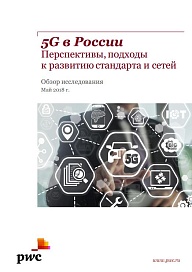As part of the research, PwC experts modeled the prospective changes in mobile traffic and the level of capital investments in deploying 5G in 20202027. Having analyzed the results, PwC experts give their view on possible development paths for the new standard and on optimum scenarios. Analysts point out that, in the process of developing new generation mobile networks in the next decade, service providers will definitely face challenges like further growing traffic (by 1221 times in the next decade, according to PwC) and a necessity to employ new high frequency bands and to improve the quality of their services while struggling with a fierce competition and a low rate of revenue growth in the industry.
Fifth-generation technologies will provide effective responses to these challenges, including the required bandwidth growth, and will enable the carriers to develop the networks based on existing infrastructure without an explosive growth in the number of small cells or the level of capital investments. As part of the research, the experts modeled capital expenses and operating costs for 5G networks in Russia in 20202027, based on three scenarios for building digital infrastructure derived from an analysis of global practices: 1) each carrier develops its network independently, 2) each carrier builds 5G infrastructure independently, and 3) a single national fifth-generation network is created. The results of the modeling show that even at extreme projected rates of traffic growth, with 5G networks reaching high target coverage, while the current competition models in developing the infrastructure are preserved, the industry isnt likely to face a significant rise in capital investments compared to the current level.
.png)
As estimated by PwC, overall growth in mobile network coverage in Russia up to 2027 caused by implementing 5G will not exceed 20% of previous-generation networks coverage, granted that the necessary frequency resources are allocated. A coverage growth of about 410% is much more likely. In the scenario where each service provider develops its network independently, the average level of overall capital investments in 5G infrastructure in 20202027 (radio access network and additional backhaul capacities) is estimated at 130165 billion rubles for each provider, or about 550610 billion rubles for the industry as a whole (about 8% of total annual revenues of the industry).
5G evolution based on multi-standard 4G/5G networks will be the most economically viable (and the most widely used globally) scenario for implementing fifth-generation technologies. Developing 5G networks, as well as new technologies and services based on it, largely depends on the effectiveness of industry policies. It would be advisable for Russia to introduce a number of leading practices used in countries with advanced digital economies, such as allocating required frequency bands while taking into account international harmonization for all key 5G usage scenarios (< 1 GHz, 16 GHz, > 24 GHz) and distributing them on a competitive basis; forming a long-term policy for developing 5G; supporting the competitive model of developing mobile networks; ensuring technological neutrality of using radio frequency resources; reducing administrative and other barriers to building networks, etc.






